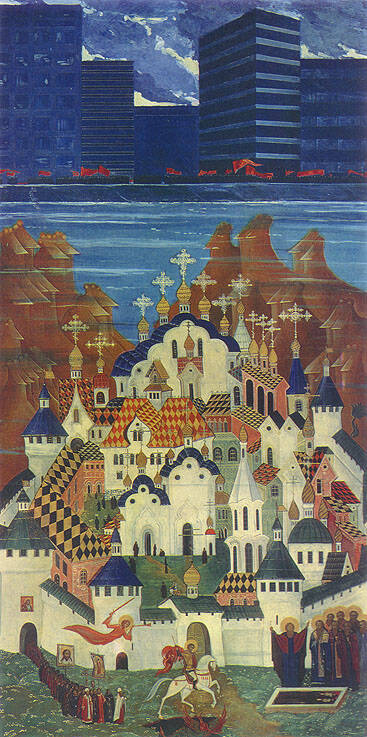
Here is a painting by Ilya Glazunov, of the lost Russian city of Kitezh. According to legend, Kitezh sat on the banks of Lake Svetloyar in central Russia. When, in the 13th century, Mongol invaders approached the undefended city, its people prayed fervently for salvation, and the entire city disappeared beneath the lake. On calm days some people can hear the sound of church bells and singing voices coming from beneath the waters.
In the 1990 painting, the world above the waters is a modern city whose people are taking part in some political procession, waving red banners, oblivious to the praying faithful, the Theotokos, and the company of saints including St George, submerged beneath them. The grim modern, political city seems to sit like a weight on the beauty below. It's probably significant that the painting was made during the fall of the Soviet Union; a few years earlier it would have been banned.
This image has haunted me for years; it's on my computer desktop right now. However it was originally intended, for me it's a reminder of St James' "Do you not know that friendship with the world is enmity with God?" (James 4:5)
Though it's difficult to say in a Church whose history is so closely tied to the glories of imperial Byzantium and Russia, I am convinced that every union with secular power, however seemingly advantageous at the time, wounds the Church of Christ.
We live in a time when the two most prominent Orthodox Patriarchates have made themselves willing tools of warring secular powers. Thus the spread and proclamation of the Gospel of Christ is submerged. I pray for, and expect, a day when the Church will be free of this bondage.
______
For a sad exploration of the modern-day Church's debilitating entanglement with worldly powers, read Matthew Namee's superb "How Did Orthodoxy Get Into This Mess?".
I first encountered the image in this interview (by my friend Jim Forest) with Alexander Ogorodnikov, an Orthodox Christian who spent years in Soviet prison for founding a "Christian Seminar" in the 1970s. He and his companions used "searching for Kitezh" as a metaphor for their efforts to recover Orthodox spiritual life under Soviet domination.